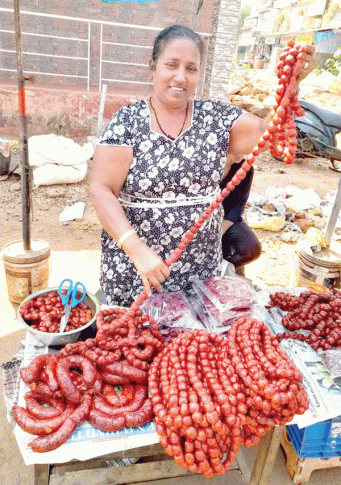
Anisha Francis
PANJIM: Clara Fernandes is a well-known face in the Mapusa market. She’s the go-to chorizo vendor for an entire generation of Goans who grew up around Bardez and beyond, who swear by the fiery, smokey, handmade rosaries of Goa sausages that she brings to the market everyday, come rain or shine, all the way from her home in Quepem, over 60 km away.
“It’s worth the commute, because the people in Mapusa market-both customers and vendors- are like family to me now. There are no fights, everyone gets along, and I have built my business from the ground up, at this market,” says Fernandes, who makes the one-and-a-half hour drive down to the town with her husband, and 70 kilos of chorizo in tow, which sell out completely, every single day. On Fridays, which is market day, the couple sells a minimum of 100 kilos of chorizo, and during the festive season, even 200 kilos, in a single day.
Steeped in toil and tradition, Fernandes’ business is not easy by any stretch of imagination, and was not always this successful. “Especially not for a 11-year-old,” she smiles, recollecting how she began making and selling chorizo in her childhood.
Born in Mapusa, into a family of four children, Clara remembers going to school for a few years, as long as her father, was alive. Clara’s father was a pork butcher, and used to bring the pigs home on his cycle, and after fattening them up, would slaughter them on Sundays and Wednesdays. He made just enough to make ends meet, and to supplement their income, her mother made small quantities of chorizo to sell alongside the meat. Clara’s life changed when her father passed away suddenly when she was 11 years old- she had to drop out of school to help her mother earn a living.
“That’s when I started accompanying my mother to the Mapusa market with our homemade chorizo. I know this place and the people here like the back of my hand,” she says. Back then, one rupee would fetch you a string of 25 rosary sausages. “A full-grown pig used to cost Rs 30 to 50, and pork was sold for Rs four to five a kilo. Today, I sell 100 rosaries for Rs 350, while pork sells for Rs 280-300 per kilo. How the times have changed, but some things remain the same,” she says, sitting under her umbrella like she has for the past 40-odd years, surrounded by her bright red chorizo, their pungent, heady aroma wafting across the market lane.
Despite toiling hard, poverty and hunger continued to plague the family, and she was forced to get married at the young age of 18. Her husband, then a taxi driver from Quepem, is now her partner in her flourishing chorizo business, and a good man, she says. “I continued to make chorizo to supplement our income, and despite the distance, insisted that we travel by bus to Mapusa to sell our wares everyday, because this is where I grew up,” she says. Her business grew steadily, and watching her interact with her regular customers, it’s easy to see why. Clara’s humility and cheerfulness is downright endearing, and people are drawn to her small table laden with different kinds of fresh chorizo, made with love.
Goans who visit from Europe or London make a beeline for her shop, and buy the precious sausages in bulk, to take back with them. “There’s a huge demand for authentic Goan chorizo in the UK and Gulf countries, and even foreigners have grown to love it,” she says. However, making chorizo like it has been made for centuries is an arduous task. “To begin with, everything has become so expensive now, and sourcing the right ingredients is difficult. Labour is another problem; I am lucky to have found two good workers who help me in this painstaking job,” says Clara. “Firewood is hard to come by as so many forested areas have now disappeared. Sourcing the casings for the sausages, which is made from cows’ intestines is another issue; we now have to source them from other States like Kerala and West Bengal, where beef is widely consumed,” she explains. She buys the pork fresh from a local butcher, around 70-100 kilos per day. Making the sausages takes three days - the meat is washed and properly drained by placing weights on it on the first day. On the second day, the masalas- spices grown in local plantations and kashmiri red chillies for their bright red hue- are added to the meat, with Goan palm vinegar that she makes herself. On the third day, the meat is stuffed into the casings, and smoked using a wood fire.
“It is a laborious process, but there are no shortcuts to this ancient art,” says Clara, who worries that the tradition of making chorizo may soon die out, as younger Goans are not interested in the culinary treasure- except for eating them, perhaps. “Youngsters today want white-collar jobs, they want to go abroad or those who do not chase government jobs. How will our traditions survive if nobody wants to continue them?” she questions, lamenting that chorizo made in factories simply do not taste or smell the same. “My advice to young Goans today is to stop shying away from their roots, and to keep the Goan identity alive by reviving traditional occupations like toddy tapping, and making chorizo,” she says.
The couple, who do not have any children, are still sure to leave a legacy behind. While they make the trip to Mapusa market six days in a week, Sunday’s are kept aside for visits to orphanages and homes for the elderly. “What else are we earning for? 10 percent of our profits goes to the church, and we use the rest to help people who have not been as fortunate as us. Since I did not get to finish school, education of the girl child is a cause that is very close to my heart, and my husband and I work hard even today so we can provide an education to as many children as possible besides helping many others to settle down in life,” she says. “We do not have any major needs; we have been able to build our own terraced house in Quepem, and are happy with what we have. All I hope is that we can now inspire youngsters to carry on these traditions, so the people who come after us will also get to enjoy Goan chorizo in all its spicy glory,” she says.
